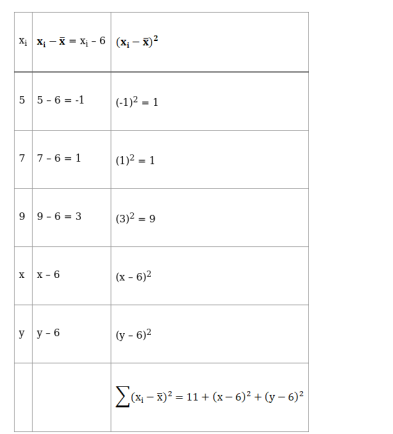The mean and variance of five observations are 6 and 4 respectively. If three of these are 5, 7 and 9, find the other two observations.
Given: Mean of 5 observations = 6
and Variance of 5 observations $=4$
Let the other two observations be $x$ and $y$
$\therefore$, our observations are $5,7,9, \mathrm{x}$ and $\mathrm{y}$
Now, we know that,
$\operatorname{Mean}(\overline{\mathrm{x}})=\frac{\text { Sum of observations }}{\text { Total number of observations }}$
$6=\frac{5+7+9+x+y}{5}$
$\Rightarrow 6 \times 5=21+x+y$
$\Rightarrow 30-21=x+y$
$\Rightarrow 9=x+y$
or $x+y=9 \ldots$ (i)
Also,
Variance = 4
Variance, $\sigma^{2}=\frac{\sum\left(\mathrm{x}_{\mathrm{i}}-\overline{\mathrm{x}}\right)^{2}}{\mathrm{n}}$

So Variance, $\sigma^{2}=\frac{\sum\left(\mathrm{x}_{\mathrm{i}}-\overline{\mathrm{x}}\right)^{2}}{\mathrm{n}}$
$4=\frac{11+(x-6)^{2}+(y-6)^{2}}{5}$
$\Rightarrow 20=11+\left(x^{2}+36-12 x\right)+\left(y^{2}+36-12 y\right) \Rightarrow 20-11=x^{2}+36-12 x+y^{2}+36-12 y$
$\Rightarrow 9=x^{2}+y^{2}+72-12(x+y)$
$\Rightarrow x^{2}+y^{2}+72-12(9)-9=0$ [from (i)]
$\Rightarrow x^{2}+y^{2}+63-108=0$
$\Rightarrow x^{2}+y^{2}-45=0$
$\Rightarrow x^{2}+y^{2}=45 \ldots$ (ii)
From eq. (i)
x + y = 9
Squaring both the sides, we get
$(x+y)^{2}=(9)^{2}$
$\Rightarrow x^{2}+y^{2}+2 x y=81$
$\Rightarrow 45+2 x y=81[$ from (ii)]
$\Rightarrow 2 x y=81-45$
$\Rightarrow 2 x y=36$
$\Rightarrow x y=18$
$\Rightarrow \mathrm{x}=\frac{18}{\mathrm{y}}$ …(iii)
Putting the value of x in eq. (i), we get
x + y = 9
$\Rightarrow \frac{18}{y}+y=9$
$\Rightarrow \frac{18+y^{2}}{y}=9$
$\Rightarrow y^{2}+18=9 y$
$\Rightarrow y^{2}-9 y+18=0$
$\Rightarrow y^{2}-6 y-3 y+18=0$
$\Rightarrow y(y-6)-3(y-6)=0$
$\Rightarrow(y-3)(y-6)=0$
$\Rightarrow y-3=0$ and $y-6=0$
$\Rightarrow y=3$ and $y=6$
For y = 3
$\mathrm{x}=\frac{18}{\mathrm{y}}=\frac{18}{3}=6$
Hence, x = 6, y = 3 are the remaining two observations
For y = 6
$x=\frac{18}{y}=\frac{18}{6}=3$
Hence, x = 3, y = 6 are the remaining two observations
Thus, remaining two observations are 3 and 6.
